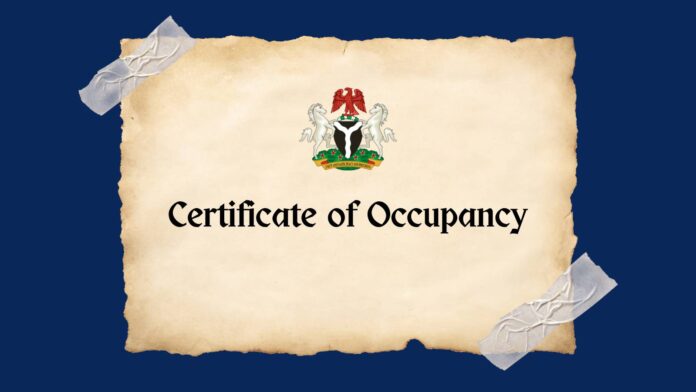Don’t buy a Land, that you will not own.
Imagine you just finally purchased a land in Nigeria. The excitement and you’re already picturing that dream duplex on the residential plot in Port Harcourt.
But weeks later, someone else shows up with a claim to the same land. Or worse, the government suddenly marks it for demolition. Why? Because You never had a Certificate of Occupancy (C of O).
This isn’t fiction. It’s a common nightmare many Nigerians face, especially those living abroad when investing in land back home. And it’s all rooted in one critical mistake: not understanding land documentation.
Owning land in Nigeria without any documentation like C of O or Deed of Conveyance is like building a house on shifting sand. Even if you’ve paid the full price, built a house, and fenced your land, you’re still exposed to:
Government Acquisition: The government can legally reclaim that land if there’s no valid C of O and there’s little you can do about it.
Title Disputes: Multiple people may lay claim to the same land. Without a C of O, you’re just “a caretaker” in legal terms.
Zero Resale Value: Want to resell or use it as collateral for a loan? Forget it. No bank or serious buyer will touch land without proper title.
No Building Approvals: You can’t legally build or develop without the proper documentation.
Worse still? Scammers thrive on this confusion. They sell land without titles, and unsuspecting buyers, especially those abroad, fall victim to “too-good-to-be-true” deals with no legal footing.
The Certificate of Occupancy (C of O) is the single most powerful document that proves legal ownership of land in Nigeria. Issued by the government, it’s your receipt of ownership, your protection against land grabbing, and your passport to development.
In this detailed post, I’ll break it all down for you, from what a C of O really is, to how to get one, what it costs, how it protects you, and how platforms like WinFarm help simplify the process (especially for Nigerians abroad).
What’s the Difference Between a C of O and an R of O?
Many Nigerians get confused between Certificate of Occupancy (C of O) and Right of Occupancy (R of O)—but the difference could make or break your investment.
C of O (Certificate of Occupancy):
A C of O is the official document issued by the state government to a landowner, confirming that you have legal rights to occupy and use a specific portion of land for a set period (usually 99 years).
It’s the highest form of land title in Nigeria. Once you have it, your ownership is recognized by law, and the government cannot arbitrarily reclaim the land without due process and compensation.
R of O (Right of Occupancy):
An R of O, on the other hand, simply grants you permission to use the land. It’s more like a tenancy agreement with the government. It’s common in Federal Capital Territory (Abuja) and in rural areas where land hasn’t yet been fully titled.
While it does offer some legal standing, an R of O does not provide full ownership rights. You cannot resell the land freely, use it as collateral in a bank, or develop it without further approval.
Key Difference:
C of O = Ownership.
R of O = Permission.
✅ If you’re investing in land for sale in Nigeria, especially as a Nigerian living abroad, always insist on properties with C of O to avoid complications.
Cost Breakdown of Getting a C of O in Major Nigerian States
The cost of obtaining a C of O in Nigeria varies depending on the state, location, size of the land, and government policies. Below is a rough estimate across some key areas:
Lagos State
Application Fee: ₦10,000 – ₦20,000
Survey Plan & Documentation: ₦300,000 – ₦500,000
Charting, Endorsement & Processing: ₦150,000 – ₦250,000
Stamp Duty & Registration: ₦200,000 – ₦400,000
Estimated Total: ₦650,000 – ₦1,200,000
Note: Land costs in Lagos are higher, so C of O processing tends to be more expensive.
Abuja (FCT)
Application & Processing: ₦100,000 – ₦300,000
Survey Fees: ₦250,000 – ₦400,000
Legal & Miscellaneous: ₦100,000+
Estimated Total: ₦500,000 – ₦800,000
Abuja lands usually come with R of O, but you can apply to upgrade it to C of O in certain districts.
Rivers State (Port Harcourt)
Application Fee: ₦20,000
Processing & Inspection: ₦450,000 – ₦600,000
Registration & Legal: ₦350,000 – ₦600,000
Estimated Total: ₦800,000 – ₦1,200,000
If you’re buying from a real estate company like WinRealty, we help our clients secure a C of O, making the process simpler for buyers.
Why a Land Without a C of O Is Almost Like “Renting
Here’s a hard pill to swallow: If your land doesn’t have a C of O, you don’t fully own it.
Yes, you may have receipts. Yes, your family may have “used that land for generations.” But under the Land Use Act of 1978, all land in Nigeria belongs to the government.
No C of O = No Legal Claim
The C of O legally recognizes you as the occupant for up to 99 years. Without it:
You can’t prove ownership in court.
You can’t sell the land easily.
You can’t get government approvals to build or develop it.
You can’t use it as collateral for loans.
You risk losing it during government reclamation projects.
It’s like renting a house without a tenancy agreement; you’re at the mercy of the landlord (in this case, the government).
✅ For Nigerians in the diaspora, the C of O is your insurance policy. It protects your land investment even when you’re thousands of miles away.
Red Flags to Avoid When Buying Land in Nigeria
The Nigerian real estate market is filled with genuine deals—but also landmines. Here are the top red flags to watch out for:
🛑 No Title Documents
If the seller can’t show any title documents (C of O, Deed of Assignment, Gazette, etc.), walk away. This is the most basic sign of a problematic land.
🛑 Too-Good-To-Be-True Prices
Beware of lands that are far below market value. They may be under dispute, in government-acquired zones, or sold by fraudsters.
🛑 No Physical Inspection
Never buy land without physically inspecting or sending someone you trust. Many people abroad have bought land that doesn’t even exist.
🛑 Multiple Agents or Disputes
If too many people are claiming rights to the land (family, agents, etc.), that’s a major red flag. You might be walking into a land dispute that’ll drain you emotionally and financially.
🛑 No Survey Plan
If the land hasn’t been charted or surveyed, it might be on government-acquired land or flood-prone zones. Insist on seeing a registered survey plan before payment.
✅Buy from registered, reputable real estate companies like WinRealty, who offer verified affordable lands in Nigeria—fully titled and ready for immediate allocation.
Are you Ready to Buy Land in Port Harcourt or anywhere in Nigeria today?
At WinRealty, we help everyday Nigerians like you make safe, affordable, and verified land investments in Port Harcourt and beyond.
Contact us today to see our available plots, schedule a site inspection, or ask us any questions!

